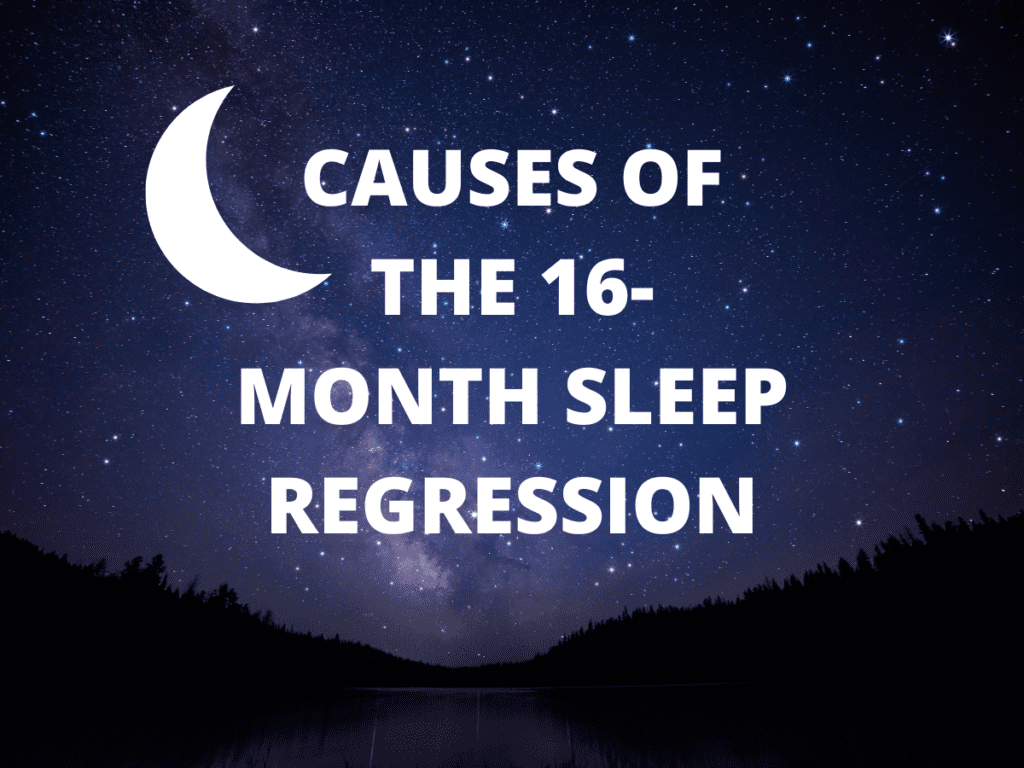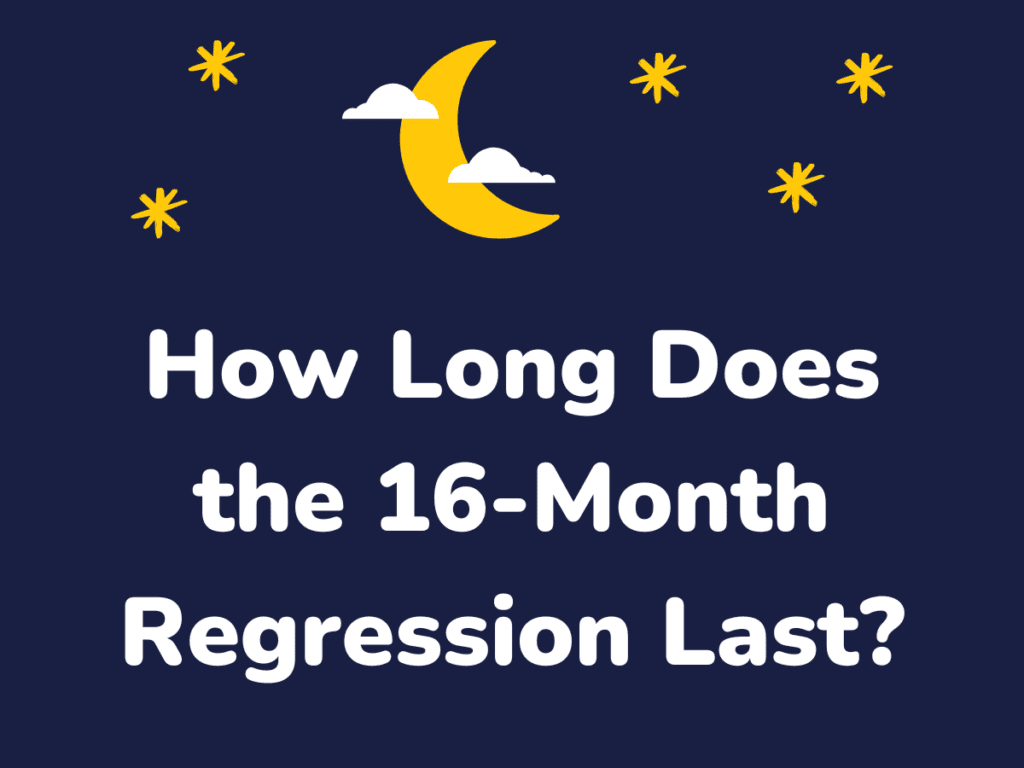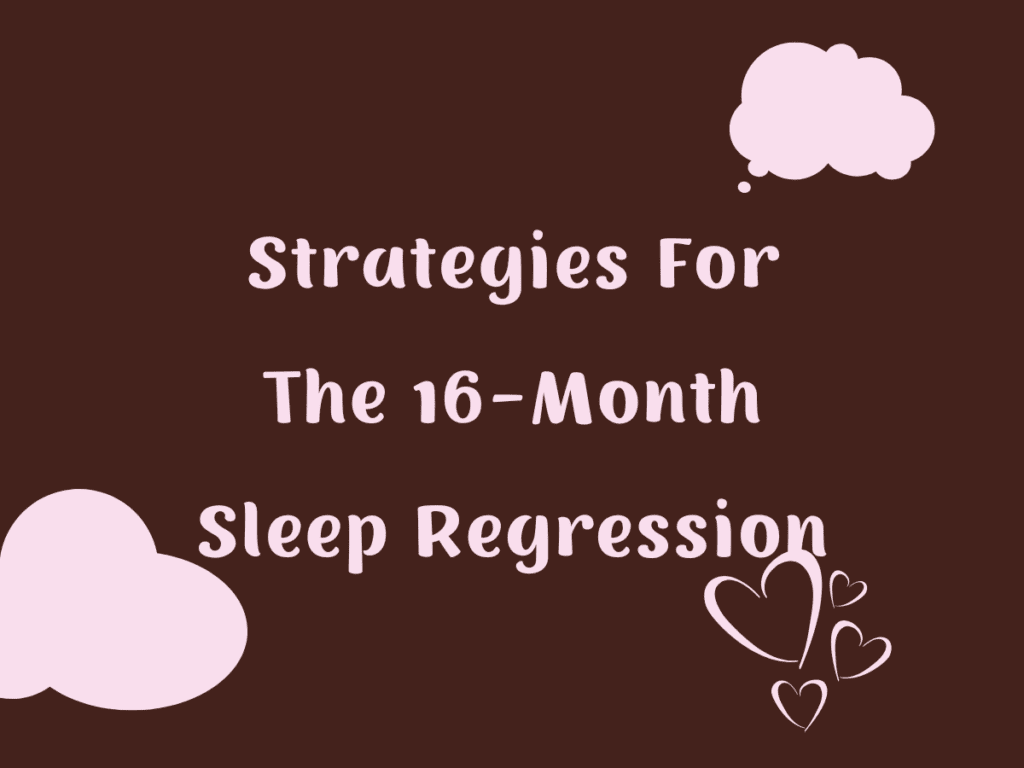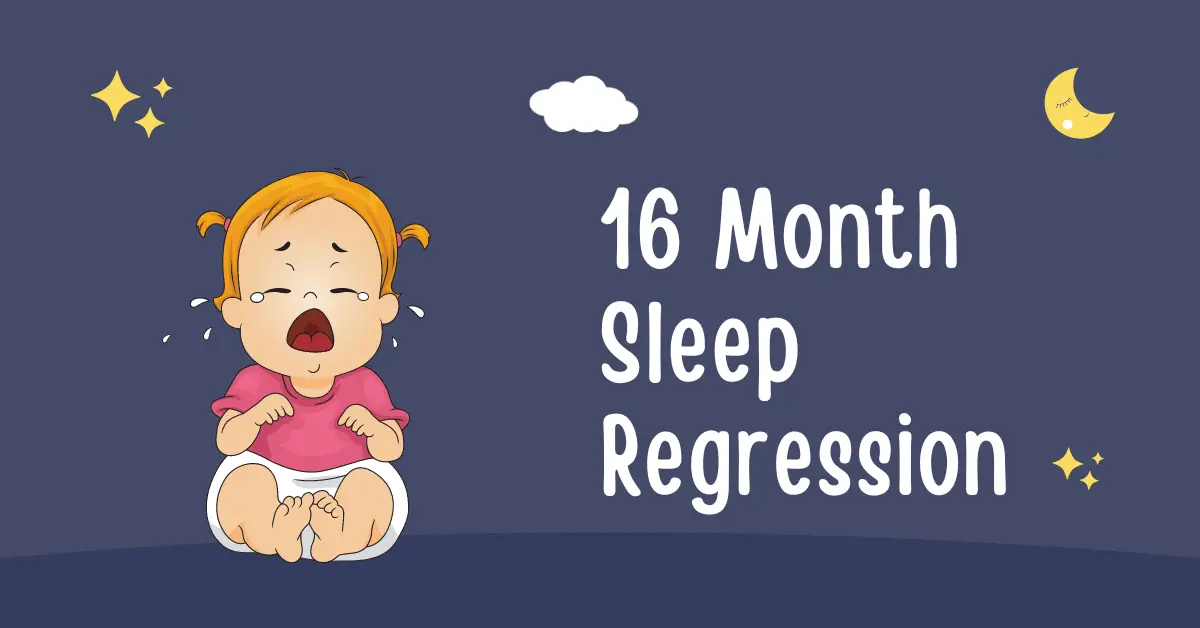If you’ve clicked on this article, chances are you have a 16 month old sleep regression and their sleep patterns have taken a twist. Fear not, this is a common phase, and with a touch of understanding and some tried-and-true strategies, you can ease your anxiety and help your toddler transition smoothly.
Toddler sleep regressions can be baffling, especially if you’ve just gotten used to your baby sleeping soundly. Suddenly, you find yourself with a very awake and sometimes very fussy toddler in the middle of the night. Let’s take a gentle journey together to comprehend the 16-month sleep regression and arm you with some handy tips to get through it.
Disclaimer: This article provides general information and suggestions about the 16-month sleep regression and is intended for informational purposes only. It is not a substitute for professional medical advice, diagnosis, or treatment. Always seek the advice of your pediatrician or another qualified health provider with any questions you may have regarding your child’s health or well-being.
Is There Sleep Regression at 16 Months?
So does the 16-month sleep regression actually exist? In short, yes, it does. But don’t fret—it’s a normal part of toddler development.
Sleep regression is when a baby or toddler who has been sleeping well suddenly starts waking up more frequently at night, has trouble falling asleep, or alters their nap habits. At around 16 months of age, many toddlers experience such changes in their sleep patterns.
While the term regression might sound like your child is moving backward in their sleep habits, this isn’t a sign of them forgetting how to sleep. Instead, it’s closely tied to the numerous developmental milestones they are reaching at this age.
Interestingly, there are several sleep regressions throughout infancy and toddlerhood. Some parents might recall the challenges of the 4-month or the 18-month sleep regression. The 16-month regression is simply one of the stops along the journey of your child’s growth and development.
The takeaway? It’s a phase, and like all phases, it will pass. In the meantime, understanding the reasons behind it can provide some clarity and help you navigate it more confidently.

The Causes of the 16-Month Sleep Regression
Alright, let’s get to the heart of it: Why is your toddler, who might’ve been a good sleeper, suddenly channelling the sleep habits of a newborn? Here are the primary reasons:
- Separation Anxiety: At around 16 months, many toddlers begin to grasp the concept of object permanence — understanding that things exist even when they can’t see them. So, when you leave the room, your little one knows you’re somewhere out there, and they might just want to be with you. This realization can sometimes lead to bedtime battles or midnight calls for mom and dad.
- New Skills and Developmental Milestones: Toddlers are like little sponges, absorbing everything and rapidly learning new skills. Whether it’s walking, talking, or mastering a new game, these milestones can be both exciting and, well, a bit disruptive to sleep. They might wake up in the middle of the night eager to practice their newfound abilities.
- Sleep Pattern Changes: As babies grow into toddlers, their sleep patterns evolve. You might notice variations in awake times, sleep cycles, and even the duration of naps. This is all part of their body adjusting to new sleep needs.
- Night Wakings and Disturbances: We all wake up several times during the night. For toddlers experiencing sleep regression, they’re more alert during these natural night wakings. Instead of drifting back to sleep as they might’ve done before, they become fully awake and may find it challenging to settle down again.
- Growth Spurts and Developmental Leaps: Just like those early days of infancy, toddlers go through growth spurts. These physical and cognitive leaps can lead to increased hunger or just general discomfort, affecting their sleep.
Recognizing these causes can be a game-changer. It shifts the narrative from feeling helpless to understanding that there are tangible reasons for these sleep disruptions. And with understanding comes the ability to respond with empathy and effective strategies. Let’s explore some of those next.
Symptoms of the 16-Month Sleep Regression
Okay, now that we’ve shed some light on the reasons behind the 16-month sleep regression, how can you tell if your toddler is truly going through it? Here’s a snapshot of some telltale signs:
- Crying and Emotional Outbursts: Your previously independent sleeper may suddenly resist bedtime, waking up in tears or showing signs of distress when it’s time to hit the hay. These emotional outbursts can stem from separation anxiety or simply the frustration of not being able to settle.
- Changes in Nap Times: Has your toddler’s trusty nap schedule gone haywire? They might be resisting their usual nap time, taking shorter naps, or even skipping them altogether. It’s also not uncommon for toddlers to have a few days of extra-long naps followed by days of nap refusal.
- Frequent Night Wakings: If your little one is popping up like a night owl multiple times when they used to sleep straight through, it’s a classic symptom. These night wakings can be due to their changing sleep patterns or the urge to practice new skills.
- Difficulty Settling Down: Even with the best bedtime routine, your 16-month-old might suddenly find it hard to settle down. They might toss and turn, play with their crib toys, or even stand up and chat away.
- Clinginess or Increased Attachment: Beyond the bedroom, you might find your toddler is a bit more attached to your hip during the day. That clinginess is often a reflection of the separation anxiety they’re experiencing.
Remember, each toddler is unique, and not every child will show all (or even any) of these symptoms. It’s all about observing changes in your child’s typical behaviour. Knowing these signs can help you approach the situation with more understanding, making the phase a bit easier for both of you.

How Long Does the 16-Month Regression Last?
It might be a brief blip on the radar, lasting just a couple of weeks. For others, it could extend over a month.
Several factors influence its duration:
- Intensity of Developmental Milestones: If your toddler is hitting multiple milestones at once (think walking, talking, and mastering a new skill all in a short timeframe), it might take a little longer for them to adjust and return to their regular sleep schedule.
- External Changes: Events like moving to a new house, starting daycare, or even welcoming a new sibling can extend the duration of sleep regression as your toddler adjusts to these major changes.
- Your Response: Consistency is key. The more consistent you are in your responses and bedtime routine, the quicker your little one might adapt and overcome this phase.
While it’s essential to remember that every child is different and there’s no one-size-fits-all answer, the good news is that the 16-month sleep regression is a temporary phase. It may feel like a long time, but with patience, understanding, and a sprinkle of perseverance, both you and your toddler will emerge from this stage even stronger and more connected. And as you navigate through, we’re here to offer some actionable tips to make the journey smoother.

Strategies For The 16 Month Sleep Regression
Navigating through the 16 month sleep regression might feel like you’re charting unfamiliar territory, but with the right tools in your toolbox, the path becomes clearer. Here are some strategies you might consider:
- Maintain a Consistent Bedtime Routine: Even if your toddler is resisting sleep, a predictable bedtime routine can provide a sense of security and comfort. This could include reading a story, singing a lullaby, or some gentle cuddles before laying them down.
- Offer Reassurance: If separation anxiety is at play, sometimes all they need is a little reassurance that you’re close by. A soothing voice or a gentle touch can work wonders.
- Prioritize Daytime Activities: Ensuring your toddler gets plenty of physical activity and fresh air during the day can help them sleep better at night. Maybe it’s a good time for a new playdate or a visit to the local park?
- Create a Sleep-Friendly Environment: Make sure their sleeping space is conducive to rest. Consider using a white noise machine, ensuring the room is dark, and check for any potential disturbances. Some toddlers love sleep sacks as well.
- Adjust Nap Schedules: If your toddler is resisting their regular naps, consider tweaking the timings a bit. Observing their wake windows and adapting to their natural sleep needs can make nap time smoother.
- Stay Calm and Patient: Remember, this is as new for them as it is for you. If they sense your anxiety, it might make settling harder. Deep breaths, everyone!
- Seek Support: It’s okay to ask for help. Whether it’s leaning on your partner for those midnight wake-ups, getting advice from other parents, or consulting with certified sleep consultants, a little guidance can go a long way.
- Monitor Screen Time: The American Academy of Pediatrics suggests limited screen time for toddlers. Too much exposure, especially before bedtime, might impact their sleep quality.
- Celebrate Small Wins: Did they sleep a little longer tonight? Yay! Celebrate the progress, however small, and remember that this phase is just one of the many adventures in parenting.
It’s also worth noting that while these tips can be beneficial, they might not all work for every child. It’s about experimenting and finding what’s best for your unique little one. And most importantly, trust your instincts. You know your child best. With a combination of understanding, patience, and a sprinkle of trial and error, you’ll find the rhythm that works for your family.
The Good News: Silver Linings Amidst the Sleep Regression
It might feel like a storm cloud has temporarily taken residence over your household, but here’s the silver lining – there’s always good news amidst the challenges of the 16 month sleep regression!
- Developmental Progress: First and foremost, the primary reason for this sleep regression is the rapid developmental progress your toddler is making. They’re achieving new skills, exploring their independence, and becoming more aware of the world around them. It’s like they’ve suddenly realized how vast and exciting the universe is!
- Bonding Opportunities: Those extra night wakings? They might be tough, but they also offer unexpected moments to bond. The quiet of the night, with its soft whispers and gentle cuddles, can become cherished memories.
- Temporary Phase: It’s essential to emphasize that the 16-month sleep regression won’t last forever. In the grand scheme of things, it’s a brief moment in your child’s life, and you both will move past it.
- Building Resilience: Both you and your toddler are building resilience during this time. For your child, they’re learning to adapt to their changing body and mind. For you, you’re discovering the depths of your patience and the strength of your love.
- Community Support: You’re not alone in this journey. Countless parents are experiencing or have navigated through similar challenges. This shared experience often leads to strengthened community bonds, shared tips, and the comforting knowledge that others understand what you’re going through.
- A Chance to Refine Routines: If there’s ever a time to fine-tune or adjust your daily routines, it’s now. The regression offers a unique window to observe what’s working and what’s not, allowing you to craft a schedule that better suits your growing child’s needs.
So, while the nights might seem longer and the days a tad more challenging, there’s a lot to be optimistic about. Keep your focus on the broader picture, relish the small moments of joy, and remember that this too shall pass, leaving behind memories and experiences that enrich your parenting journey.
Wrapping Up 16 Month Sleep Regression
The period of time when your 16-month is going through sleep regression might sometimes feel like an uphill battle, but it’s essential to remember that you’re not alone. Countless parents have been in your shoes, and many more will experience the same challenges and triumphs in the future.
At the heart of it all, this regression signals the remarkable growth and development happening in your toddler’s life. These sleep disruptions are merely a sign of their expanding world, filled with new skills, understandings, and experiences.
Here are some final thoughts to keep in mind:
- It’s Temporary: No matter how challenging the nights (or days) may seem now, this phase will pass. Before you know it, your toddler will be onto new adventures, and the sleep challenges of today will be a distant memory.
- You’re Doing Great: Yes, you! Every story, every cuddle, every patient response is a testament to your love and commitment. Parenting isn’t always easy, but it’s moments like these that truly define our strength and resilience.
- Celebrate Growth: Instead of seeing this regression as a setback, view it as a celebration of your child’s growth. They are learning, evolving, and becoming more independent every day.
- Seek Community: If there’s one thing that can ease the journey, it’s the support and understanding of fellow parents. Share your experiences, ask questions, and find solace in the shared stories of toddlerhood.
Remember, you and your little one are in this together. Each day brings new challenges, but also new joys. Embrace the journey, cherish the moments, and know that with each passing phase, you’re building a foundation of love, trust, and understanding that will last a lifetime.

